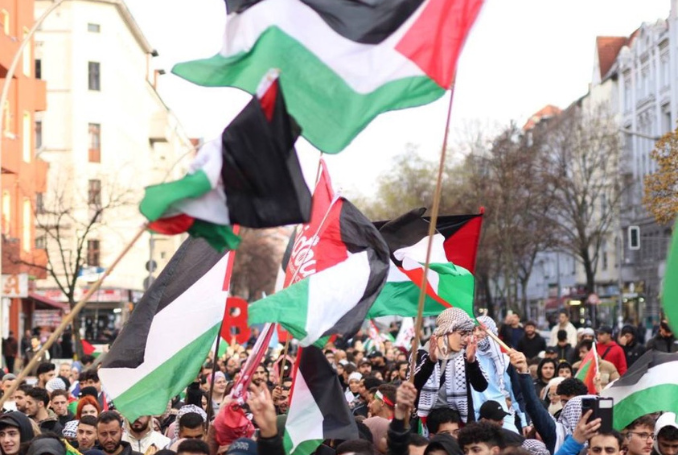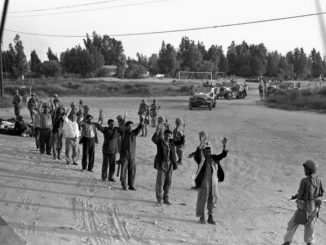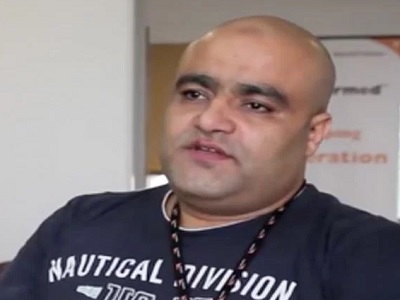
By Benay Blend
Among some circles, there is the sentiment that activists in America should focus only on what is going on in their own country, as there are enough problems here, why put their energies elsewhere? On the other hand, there is the idea that if an individual has not recently visited Palestine, whether Palestinian or not, that person could not possibly have an informed perspective with which to speak.
The latter opinion is somewhat classist, in that it privileges people who have the funds to travel, not to mention assumes that visiting a country equals understanding all aspects of conditions on the ground. It also leaves out Palestinians who might be denied access to their own country, as well as those who refuse to return until they have the right to settle there.
The former assumes that some lives are expendable, depending on what issues are deemed more important at the time. “In the U.S. left,” writes Steven Salaita, “we’re constantly asked to overlook institutional abuses or to defer the liberation of this or that downtrodden group for the sake of access or electoral success.” Moreover, as Onyesonwu Chatoyer observes, the desire to feel and receive empathy is often “manipulated by corporate media, who act on behalf of the state and the ruling class.” Very seldom does mainstream media express sympathy with Palestine, preferring instead to paint the Occupation as a “conflict” rather than an ongoing siege.
International solidarity is an important means to counter this propaganda. “We need to energize the solidarity movement every now and then,” writes Israeli activist/writer Ilan Pappé, “and the clearer the goals are, the more effective solidarity becomes.” Nevertheless, he warns that it is more difficult today for blacklisted youth to transform their enthusiasm into solidarity on the ground.
Moreover, there is increased state repression for advocates in the diaspora due to anti-BDS as well as other forms of anti-Palestinian legislation. For example, the German state, particularly in Berlin, has a long history of banning efforts by advocates for the boycott of Israel and justice for Palestine. On March 9, 2020, German officials deported Palestinian writer and activist Khaled Barakat (though he had not been living in the country since August 2019), thereby also banning him from entering the country for four years. Officials also expelled Rasmea Odeh, a Palestinian freedom fighter who was targeted and persecuted by the United States government as punishment for her supporting her community.
Additionally, for the past few years, the German state has been prohibiting demonstrations organized by Samidoun Deutschland. Specifically targeted have been Prisoner’s Day and Nakba commemorations, two memorials that protest the Zionist’s ongoing siege against the Palestinian people. On April 13, 2023, Berlin officials once again banned two demonstrations calling attention to the 4,800 Palestinians held prisoner by the Zionist occupation. There is speculation that the state might also attempt to ban Nakba demonstrations that are planned for May 15th.
Like the United States, Germany is heavily involved in the ongoing occupation of Palestine. It provides weapons and political support abroad while repressing Palestinian rights at home. It falls upon international solidarity to highlight these abuses stemming from their own respective countries, while also drawing comparisons with other comprador states that do the same.
International solidarity not only provides backing for comrades in their own and other countries who are undergoing repression for their support of the Palestinian cause. It also crosses borders to acknowledge attacks against other groups whose work is targeted by the state.
On August 3, 2022, Julie Varughese, writing for Black Agenda Report, condemned the Federal Bureau of Investigation (FBI) for raiding the properties of the African People’s Socialist Party (APSP) and its solidarity organizations in Saint Louis, Missouri, and in Saint Petersburg, Florida. Reminiscent of the Palmer Raids during the first Red Scare in the 1920s, the group, which also leads an organization known as the Uhuru Movement, has been accused of being “tools of Russia,” partly because it does not support the U.S. and NATO’s proxy war in Ukraine.
One year later, on April 18, 2023, a federal grand jury charged three members of the APSP with “acting as agents of the Russian government within the United States without prior notification.” All three face up to ten years in prison for allegedly acting as illegal agents of Russia without notifying the US attorney general, and up to give years for allegedly conspiring to have US citizens act as illegal agents.
Anti-war activists were quick to draw comparisons between anti-communist purges of the past and repression against similar groups today. In February 1951, Black socialist historian W.E.B. Dubois was indicted, arrested, and arraigned in federal court for circulating a petition opposing nuclear weapons. On June 12, 1956, musician Paul Robeson was called to testify in front of the House Committee on Un-American Activities for his political beliefs, including his support of the Soviet Union.
After the initial raids, on August 4, 2022, Samidoun: Palestinian Prisoner Solidarity Network issued a statement expressing solidarity with the Uhuru Movement and the APSP. The group claimed that these charges amounted to an attack on all anti-imperialist organizers, thereby intending to criminalize all international solidarity with “those countries targeted by U.S. imperialism.”
The statement went on to draw analogies with repression against the “Palestinian community, Palestine solidarity and anti-war/anti-imperialist organizing,” including the targeting of Palestinian leaders like Rasmea Odeh.
The ordeal of the Holy Land 5, Palestinians who were wrongfully arrested and imprisoned in the U.S. for the “crime” of sending food and medicine to Palestinian orphans in the Holy Land, and the repression of Samidoun Deutschland by the German state, fall into this category too. At risk are all popular movements that confront imperialist states and their cohorts, like the Zionist occupation.
“Imperialism has laid its body over the world, the head in Eastern Asia, the heart in the Middle East, its arteries reaching Africa and Latin America. Wherever you strike it, you damage it, and you serve the world revolution,” declared the late activist and intellectual Ghassan Kanafani. This is a perfect counter to the idea that activists who focus on Palestine are not doing justice to local issues, since, according to Kanafani, all of these causes are connected.
“The Palestinian cause is not a cause for Palestinians only, but a cause for every revolutionary… as a cause of the exploited and oppressed masses in our era,” Kanafani continued. Herein he issues a call for all movements to find a common cause with Palestine in order to defeat reactionary state repression.
In a fitting conclusion, Samidoun declared that “it is critical that when our comrades and members of our movement are targeted that we stand together in a common front of mutual defense and solidarity” against all efforts to undermine “anti-imperialist organizing, action and internationalism” around the world.

– Benay Blend earned her doctorate in American Studies from the University of New Mexico. Her scholarly works include Douglas Vakoch and Sam Mickey, Eds. (2017), “’Neither Homeland Nor Exile are Words’: ‘Situated Knowledge’ in the Works of Palestinian and Native American Writers”. She contributed this article to The Palestine Chronicle.







